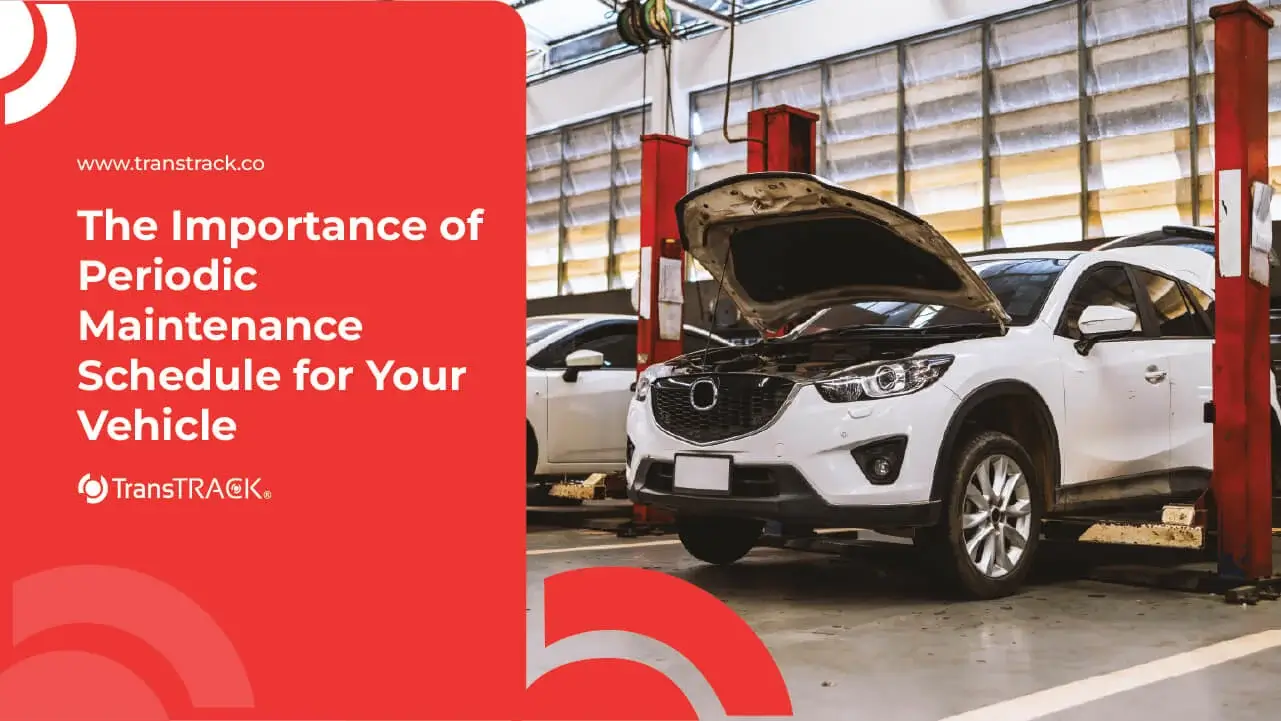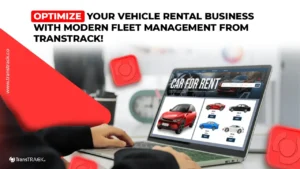The Importance of Periodic Maintenance Schedule for Your Vehicle
Posted on April 23, 2025 by Nur Wachda Mihmidati

Periodic maintenance is one of the most important aspects of maintaining vehicle reliability and performance, whether for personal use or business operations. By performing regular servicing on schedule, the risk of sudden breakdowns can be minimized, fuel efficiency maintained, and vehicle life can be significantly extended.
In the midst of high mobility and evolving operational needs, managing maintenance schedules manually is often a challenge. Therefore, understanding the importance of periodic maintenance schedules and how to automate them is a strategic step for vehicle owners and fleet managers. Get to know more in this TransTRACK article!
What is a Periodic Maintenance Schedule?
A periodic maintenance schedule is a series of maintenance activities carried out on a regular and scheduled basis on a vehicle, machine, or equipment to ensure its performance remains optimal. This maintenance includes various aspects such as oil changes, brake system checks, battery checks, and air filter cleaning, which are usually carried out based on mileage, operating hours, or a certain period of time. The goal is to prevent further damage, maintain safety of use, and extend the life of the asset.
What does periodic vehicle maintenance involve?
Periodic vehicle maintenance includes various types of inspections and component replacements aimed at maintaining vehicle performance, safety and efficiency. Here are some of the things that are generally included in periodic maintenance:
1. Fluid Change and Inspection:
- Change engine oil and oil filter
- Check and refill radiator fluid (coolant)
- Brake fluid check and change
- Transmission oil check and change
- Check power steering fluid and wiper washer
2. Brake System Check:
- Brake lining and disc check
- Brake hydraulic system check
- Cleaning and lubrication of brake parts
3. Steering and Suspension System Inspection:
- Check ball joints, tie rods, and bushings
- Shock absorber condition check
- Steering stability check
4. Electrical System:
- Battery check (voltage and condition)
- Inspection of lights, horn and charging system
- Starter system check
5. Tire and Leg Check:
- Tire pressure check
- Tire rotation
- Wheel balancing and spooring
- Tire wear check
6. Air Filter and System:
- Engine air filter replacement
- Air conditioning/cabin filter replacement
- Intake system check
7. Other Periodic Maintenance:
- Timing belt/chain inspection and replacement
- Cooling system check (including fan and thermostat)
- Air conditioning performance check
- Throttle body and injector cleaning (if required)
When is the right time for regular vehicle servicing?
The right time for regular vehicle servicing is usually determined based on mileage (kilometers) or a certain period of time, depending on which one is reached first. The following general guidelines are commonly used:
Vehicle Periodic Service Time Guide:
| Service Interval | General Maintenance Type |
| Every 5,000 km / 3 months | Change engine oil, check brakes, check tire pressure, check battery and electrical system |
| Every 10,000 km / 6 months | Change oil filter, air filter, tire balancing & rotation, suspension check, throttle body cleaning |
| Every 20,000 km / 12 months | Change transmission oil (if manual), clean air conditioning system, check engine cooling system |
| Every 40,000 km / 2 years | Axle oil change (if RWD/4WD), fuel filter change, thorough brake service |
| Every 100,000 km | Check or replace timing belt/chain, check other major components |
Important Notes:
- Heavy operational vehicles (such as trucks, project vehicles, or logistics fleets) may require more frequent servicing.
- Poor road conditions, extreme weather, or frequent traffic jams also accelerate service needs.
- Always follow the manufacturer’s manual or use a vehicle management system like TransTRACK for automatic reminders.
The Impact of Not Performing Periodic Maintenance
Not carrying out periodic maintenance on a vehicle can have various negative impacts, both in terms of safety, cost, and operational efficiency. Here are some of the main impacts:
1. Faster Component Breakdown
Without regular maintenance, components such as the engine, brakes, or cooling system can wear out or break down faster. For example, not changing the oil regularly can cause the engine to overheat and permanently wear out.
2. Costly Repairs
Minor faults that could have been prevented through maintenance can develop into major and expensive problems. For example, replacing brake pads is much cheaper than repairing a badly damaged brake disc.
3. Decreased Vehicle Performance
The engine becomes more fuel-intensive, acceleration decreases, the engine sound is rough, and the vehicle feels less comfortable to use because the components are not in optimal condition.
4. Increased Risk of Accidents
Brake, steering, and tire systems are important parts of safety. Without regular checks, the potential for accidents due to brake failure or tire blowouts is higher.
5. Shorter Vehicle Life
Vehicles that are not maintained tend to break down faster overall and do not last as long, lowering their resale value.
6. Disrupts Business Operations
For a company or fleet, a vehicle breaking down in the middle of the road or being unfit for use can cause distribution delays and significant operational losses.
What are the benefits of periodic vehicle servicing?
Performing regular servicing on a vehicle provides many benefits, both for private owners and business operations. Here are some of the main benefits:
Maintain Optimal Vehicle Performance
Regular servicing ensures that the engine, brake system, transmission, and other components continue to work properly, so that the vehicle is always comfortable and responsive when used.
Prevents Greater Damage
Regular check-ups help detect potential problems early, so they can be addressed before they develop into serious damage that is expensive to repair.
Saves Long-Term Costs
Although regular servicing costs money, it is much more economical than the cost of major repairs or replacement of parts due to negligence.
Improves Driving Safety
Regularly checked brake, tire, and steering systems will reduce the risk of accidents due to technical failures while on the road.
Extends Vehicle Life
A well-maintained vehicle generally has a longer lifespan and rarely experiences sudden breakdowns.
Maintain Vehicle Selling Value
A complete and regular service history makes the vehicle more attractive to buyers when it comes to resale.
Supports Fuel Efficiency
A clean and well-maintained engine saves fuel consumption due to a more complete combustion process.
Automate Maintenance Schedule with Vehicle Maintenance System
Vehicle Maintenance System (VMS) is a digital system designed to efficiently manage and automate the entire vehicle maintenance process. With VMS, companies no longer need to manually record service schedules or rely on reminders from drivers. The system will automatically record mileage, operating time, and vehicle condition, and send maintenance reminder notifications based on these parameters.
Through this automation, companies can reduce the risk of service delays, avoid sudden breakdowns, and optimize vehicle operating time. VMS also allows management to monitor each unit’s maintenance history in real-time, make data-driven decisions, and plan maintenance without disrupting logistics activities. Systems like TransTRACK even integrate with GPS and vehicle sensor systems, so that all important maintenance-related information can be monitored centrally and accurately.

A regular maintenance schedule is not just a routine, but an important investment to maintain vehicle performance, efficiency and safety in the long run. In the fast-paced and challenging world of operations, reliable fleet management requires a smart and integrated system.
Use TransTRACK’s Vehicle Maintenance System to automate the management of your vehicle service schedule. Get timely maintenance reminders, monitor unit conditions in real-time, and ensure every vehicle in your fleet is always in top condition. Visit TransTRACK and improve your operational efficiency today!
Topic :
Recommended Articles

Improving Fleet Safety through Traffic Accident Prevention with ADAS
Featured Product | February 12, 2026
 Bahasa Indonesia
Bahasa Indonesia







